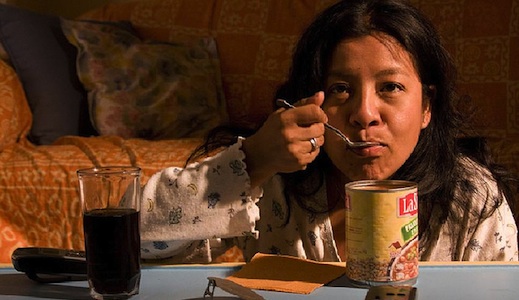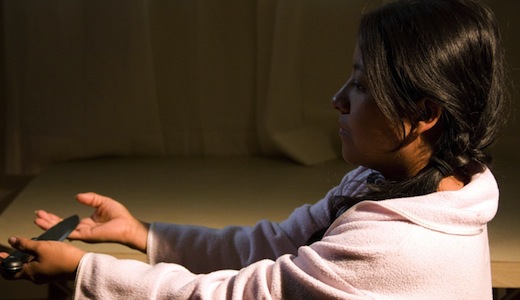Australian writer, director and producer Michael Rowe caused a bit of a stir at the Cannes Film Festival last year with his debut film, Mexico’s Año Bisiesto (Leap Year). Not only did quite a number of audiences members walk out of the film (a phenomenon allegedly replicted at the Brisbane International Film Festival and Sydney’s Hola Mexican Film Festival), it went on to win Caméra d’Or for best first feature. It marked the second year in a row that the award had gone to an Australian director, with the 2009 winner being Warwick Thornton for Samson and Delilah. Yet the walk-outs were not instigated by an anti-Australian contingent, but rather a reaction to the often brutal and confronting subject matter.
Lara (Monica del Carmen, Babel) is an overweight and lonely woman who lives a monotonous and solitary life. Her long days, filled with tinned food, television and masturbation, are only punctuated by the handful of men she brings home for anonymous sex. What we learn about her we gain in snatches of phone conversations with her mother, during which time she is an habitual liar about her meals and her relationships with her neighbours. She counts down the days of February until the 29th, a day she has mysteriously circled in red. Entering her life is Arturo (Gustavo Sanchez Parra), who at first is another of her random lovers, but soon grows into something more. Their relationship begins with a few slaps during sex, but this leads to choking, beating, urination and knife-play and a self-destructive cycle.
Año Bisiesto is a difficult film to watch. The plethora of sex scenes through the film are often hard to sit through, as it is neither erotic nor pornographic: it is a frank and unapologetic depiction of a physical relationship between two disturbed people. Yet unlike Michael Winterbottom’s 9 Songs, another film that explored a relationship through sex (and was actually far more explicit than anything in this film), this is more of a study of loneliness and isolation than it is overtly about sex. In the first half of the film, the repetition of meaningless sex with yet another man (who immediately make excuses to leave) threatens to become tedious, yet this is apt: this is Lara’s life. When Arturo begins to escalate the violence in the relationship, this is a major step for the character: perversely, she is now feeling something and as we eventually learn, it gives a purpose to Lara’s life.
The term ‘brave performance’ is often overused in Hollywood, where it tends to refer to an actress slapping on a fake nose or boldly going without makeup. Del Carmen spends much of the film naked, physically degraded and unafraid of looking unattractive. She carries a film that is set almost entirely in a single room, with little to no light (literal or figurative) penetrating her uncomfortable self-made prison. While these are not the elements of a feel-good movie, this is the anti-thesis, a feel-bad movie if you will. An intense study of depression and loneliness, and like the work of Lars von Trier, whether you like it or hate it, it is difficult not to have an opinion on Año Bisiesto.
The Reel Bits: Año Bisiesto is not the kind of movie than one can profess to loving, as the subject matter and imagery is far too confronting. It doesn’t alway hit the mark – and it may be the tedium rather than the sex than turns audiences away – yet when it works, the film is an intense study that will be difficult to ignore.
Año Bisiesto played at the Australian Film Festival on 3 March, 2011. The Australian Film Festival runs from March 2 through 13, and also includes a selection of short films on the Sunday 13 at the Ritz. For more details see the Australian Film Festival website.





